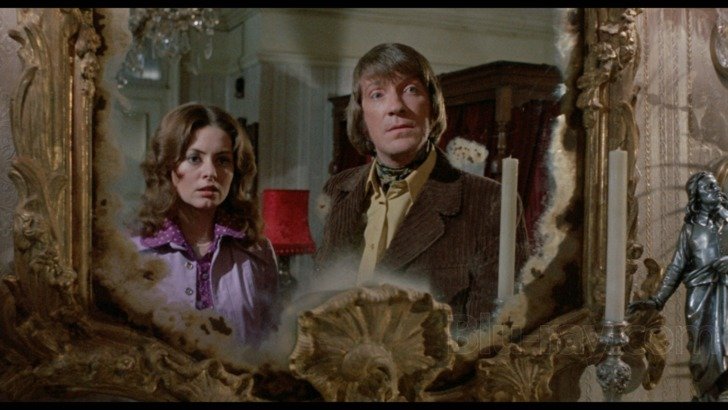
From Beyond The Grave (1973)
“I hope you enjoy snuffing it.”
The chances are, if you're of a certain age and caught in one of those pub conversations about horror movies, this one will come up. I remember distinctly the first time I saw it - split into three parts on consecutive school lunchtimes round at a friends house. It was the middle of summer, sunlight pouring in through the windows, and the house was full of 13-year-olds. And it still scared me silly.
From Beyond The Grave isn't quite the fright-fest it once appeared to be. But as possibly one of the most lovingly crafted, best made types of its genre, it still raises a few chills, and a few thrills.
I like the anthology format anyway, but it has to be said that this one's in a class of its own. Cushing's performance as a crusty northern shopkeeper is fantastic (wasn't he always), but he's only one cog in an incredibly smooth-running machine, oiled by a host of well-known faces, all hell-bent on getting a bargain by stealing some of his old rubbish.
David Warner is the first to do Cushing out of some money, when he buys an antique mirror. Why anyone would want to give it house room is anyone's guess (ditto the door in the last segment), but leaving aside such Changing Rooms considerations, Warner has soon put the monstrosity above his mantlepiece, and before you can say "let's have a seance", he and his trendy mates are... having a seance. This leads to the first seriously spooky bit of the film, when swathed in smoke, a face appears on the other side of the glass. If, like me, mirrors aren’t high on your most-liked list, then this is the point you run screaming for mother (except, of course, when you can't lose face in front of a gang of mates). Anyway, the mirror demands blood, and pretty soon the room is awash with it, as Mr Warner brings home a couple of leggy lovelies and proceeds to slice and dice 'em to death. Eventually the spirit behind the mirror is released, and changes places with the hapless Warner. There's a nice little bit when you see the room changing over the years, before someone else has the bright idea of having a seance, and up pops David, the new spooky face in the world beyond the glass.
The second segment stars the criminally underrated Ian Bannen as a cuckolded husband who tries to buy himself a bit of self esteem in the from of a DSO medal he's not entitled to. When Cushing asks for some proof of his heroism, he nicks it. Bad move. Bannen makes friends with old soldier Donald Pleasance, and ends up spending more time at Don's house than his own (where his wife, Diana Dors, is waiting to give him another tongue lashing and more beans on toast). The old soldier's daughter, played by Angela Pleasance turns out to be a witch who bumps off Dors ("Do you want me to do it?") and there's a cracking twist at the end. "Do you want me to do it? Do you want me to do it?"
Bannen's impotent outbursts at the dinner table are fantastic, as is Pleasance's fawning, cliché ridden matchbox seller, but the crown goes to Angela, who's incredibly creepy. And that last scene still makes my head itch (for some reason).
Next there's a bit of light relief in the form of a demonic possession (if you can imagine such a thing), when, on ripping off Cushing over a snuff box, a businessman is told: "I hope you enjoy snuffing it".
He ends up with an elemental on his shoulder, which only a dotty medium can see. When the elemental starts attacking the businessman's wife, he calls the medium in for an exorcism, but things go horribly wrong. Despite being played for laughs, the idea of an invisible demon sitting on your shoulder is enough to give anyone the shudders. Although any lasting feelings of dread are pretty much evaporated by the sight of his now-possessed wife kicking down the front door and disappearing into the night, screaming "Life! Life!"
Can it get any better? Oh, it surely can... Ian Ogilvy buys an antique door (but tellingly doesn't actually rip Cushing off), which ends up turning his stationery cupboard into a spooky blue room, haunted by an evil sorcerer from the time of Charles II. Luckily Ian (and his resourceful wife) suss out a way to stop the ghost before things go too badly wrong.
What's great about all of these stories is that they are intelligent, well-written, and scary stuff - without resorting to chucking gallons of blood about. The first and last stories may well be ripping off Dead Of Night, but as far as I'm concerned, when they're done this well, that's no bad thing at all. If only all the films on this site were this... good.
